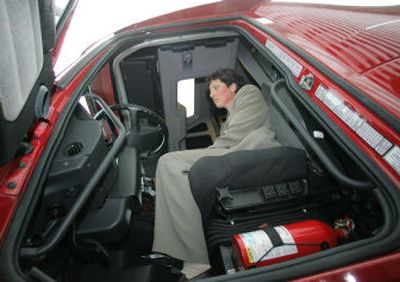Advocates criticize long trucker hours

WASHINGTON – Truckers can still spend six days on the road during the week and drive for 11 hours at a time, thanks to a rule the Bush administration decided to leave intact even though truckers and safety advocates say it’s unsafe.
For 60 years, truckers could drive for 10 consecutive hours. On Jan. 1, 2004, the Federal Motor Carrier Safety Administration changed the rule to allow them another hour behind the wheel.
A federal court, however, threw out the changes.
On Friday, the truck-safety agency announced that a revision to the rule would still allow the big rigs to roll for 11 hours, three hours more than safety advocates say they should.
“What reasonable person who has traveled our nation’s roads and highways thinks that forcing tired truck drivers to stay behind the wheel even longer is good public policy?” asked Teamsters Union President James P. Hoffa.
More than a year ago, a federal court struck down the rule, saying it “arbitrary and capricious” and failed to consider truckers’ health. The Bush administration has to revise it.
Annette Sandberg, chief of the truck-safety agency, said the new rule is backed by more research and was designed to reduce the number of crashes caused by fatigued drivers.
“The research shows that this new rule will improve driver health and safety and the safety of our roadways,” Sandberg said during a press conference.
She said the rule requires drivers to take at least 10 hours off between shifts, two more than before, and reduces the maximum work day from 15 hours to 14.
But Joan Claybrook, president of the safety group Public Citizen, said that drivers can drive 20 percent longer and spend 30 percent more time on duty under the new rule.
She said the agency’s own data show that deaths resulting from large truck crashes are up 3.1 percent from 2003 to 2004.
The Bush administration also announced a new set of rules for truck drivers who travel less than 150 miles in a day and don’t need a commercial driver’s license.
Those drivers, who typically work for retailers and small package-delivery companies, would be partially exempt from the 14-hour workday. For two days a week, they could work 16-hour days, including breaks.
Wal-Mart and other retailers have lobbied Congress to extend the workday for truckers to 16 hours, something labor unions and safety advocates say would make roadways more dangerous for all drivers.
Sandberg said it makes sense to let short-haul drivers work longer because they’re 18 times less likely to be involved in a crash caused by fatigue than long-haul drivers.
Sleepy drivers cause only 5.5 percent of all truck crashes, she said.